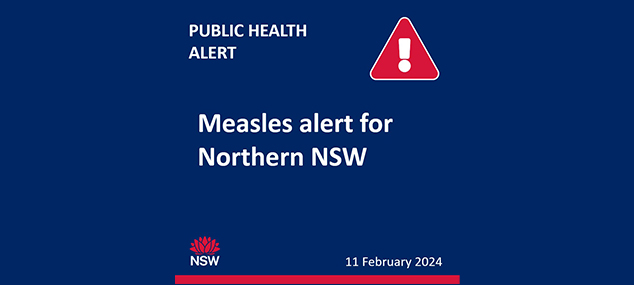
OFFICIAL from:
NSW Health is advising people to be alert for signs and symptoms of measles after being notified of one confirmed case of measles in northern NSW.
The case recently returned from Asia where there have been ongoing outbreaks of measles in several countries including Pakistan and India.
People in the following locations may have been exposed to the virus and should monitor for symptoms:
- Schoolchildren (both primary and secondary) who were on the morning and afternoon Singh Company school bus in the Murwillumbah area on Monday 5th February
- People who attended the Emergency Department at Murwillumbah Hospital on Friday 9th February between 1.15pm-4pm
- People who attended the Emergency Department at Murwillumbah Hospital on Saturday 10th February between 12.15pm-8pm.
North Coast Regional Director of Population and Public Health, Dr Valerie Delpech, said while these locations pose no ongoing risk, people who visited the above locations should be on the lookout for symptoms.
"Symptoms of measles include fever, runny nose, sore eyes and a cough, usually followed three or four days later by a red, blotchy rash that spreads from the head to the rest of the body," Dr Delpech said.
Measles is a vaccine preventable disease that is spread through the air when someone who is infectious coughs or sneezes.
“Symptoms may appear between 7 and 18 days after an exposure, so it's important for people to stay vigilant if they've been exposed, and if they develop symptoms, to please call ahead to their GP or emergency department to ensure they do not spend time in the waiting room with other patients,” Dr Delpech said.
“This latest case is a reminder for everyone to check that they are protected against measles, which is very infectious. If you were born in 1966 or after, you need to receive two doses of measles vaccine to be fully vaccinated,”
“It is particularly important to check your vaccinations are up to date before you travel as measles outbreaks are occurring in several regions of the world at the moment.”
The measles-mumps-rubella (MMR) vaccine is safe and effective against measles and is included on the National Immunisation Program for children at 12 and 18 months of age. It is also free in NSW for anyone born during or after 1966 who hasn't already had two doses.
If your child is aged 6 to 12 months and you will soon be travelling to areas considered high risk for measles, consult your GP to discuss whether your child can receive their first dose of MMR vaccine prior to your travels.
If you are unsure whether you have received two doses, it is best to get a vaccine, as additional doses are safe. This is particularly important prior to travel.
MMR vaccine is available from GPs (all ages) and pharmacies (people over 5 years of age).
If you, or a loved one, is experiencing measles symptoms, or have questions about measles, please call your GP or Healthdirect on 1800 022 222. For more information on measles, you can view the NSW Health measles factsheet.